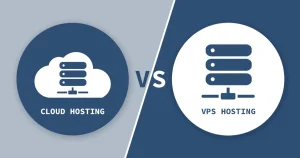Hosting services with real-time fast performance?

Cloud Hosting vs VPS Speed | Detailed Analysis
The assortment of the hosting types and hosting plans can be overwhelming, especially for those handling the hosting for the first time. For instance, some familiar names in the hosting world are shared hosting, VPS hosting, dedicated servers, and Cloud hosting. However, if one is less informed about the hosting, finding the right solution according to one’s needs is more or less like spotting a needle in a haystack. Today, let us shed some light on Cloud VPS and whether Cloud VPS sharing leads to declining performance or usability.
VPS is the hosting industry’s leading player, while the cloud is well-acclaimed at the moment. So if it is favourable to use a shared Cloud VPS server, it will turn out to be hitting the jackpot for your website.
The website is a virtual home of businesses, organizations, and individuals for all of the maneuvers dealing with the Internet. However, to broadcast this virtual home in real-time and receive visitors on the Internet, you need to purchase hosting services. Therefore, various hosting services exist to cater to diverse projects staying on the same page with their needs.
Among the most widely used hosting solutions is cloud VPS hosting. So, you are in the right place to grab a better idea of the said hosting and if Cloud VPS is best for shared hosting. But first of all, let us walk you through the background of Cloud and VPS.
VPS Hosting
VPS involves a physical server (computer machine) residing in the data centre. Virtualization technology takes part (software like KVM, VMware Hypervisor, VMware Fusion, etc.) and splits that server into a limited number of chunks. So each user gets an independent portion (a server space dedicated to him) to store the data coupled to the website.
Moreover, each virtual server can operate on a guest operating system (OS) and put the website online in VPS hosting services.

Though VPS supports scalability and flexibility, it still has limitations on the resources. In addition, the user has to pay the defined amount imposed by the web host whether all the resources are in use or not.
The exclusiveness of the VPS, making it unique, is the root access and security. Users can control their virtually portioned server completely from configuration to installation. Similarly, the high speed VPS server contains SSD drives so that it can impart ten times faster speeds than the traditional solutions.
Further, based on your tech knowledge, you can sign up for the server type (managed and unmanaged VPS hosting). Your web host handles all the server tasks in managed VPS hosting. In unmanaged, you can get a control panel to ease the server and website management.

Cloud Hosting
On the other hand, Cloud Hosting vs VPS Speed is important matter to consider. It employs several interconnected servers on the Internet residing in varied locations globally, making it a cloud. The central concept behind cloud computing is to render services through the Internet instead of the physical computer.
So a website is stored and available across a network of several remotely located servers. Even if something happens to a server and it collapses, another server powers your website right away.
Further, you neither have to migrate the data to avail off the new server nor go for any server setting changes. Thus, the most prominent benefit of the cloud is your website never goes down, marking the technical term Uptime as maximum. Additionally, cloud servers use encryption.
The servers’ global placement offers the lowest latency and ensures the fastest loading speeds for small to enterprise-level websites and apps.
Similarly, the cloud enforces no resource restrictions, including data transfers, since a website wields several servers. So the user can flexibly add or remove the resources on-demand with its Windows or Cloud Linux hosting. What more is the pricing model; you will pay for what you will use.
Pricing: Addedly, it has an affordable price, which is why many web hosts and customers favour it. You can get a cheap Linux web hosting server starting from $40 per year, which makes it around $2 to $3 per month.
So, what is Cloud VPS Hosting?
Until now, you might have got the idea of what cloud VPS is going to be. It is more like a combo of the VPS hosting services and cloud infrastructure using KVM with cloud computing.

- It means you will acquire dedicated server space permitted for instant scalability at any time and will pay accordingly.
- While choosing its own OS, the website can enjoy maximal uptime and tackle traffic spikes with the needed amount of resources.
- It is a good call for the users/ businesses needing specific modules, languages, or different MySQL databases, etc.
- In addition, Best Cloud VPS hosting lets you have full root-level, SSH, and (S)FTP access.
- Similarly, the Windows operating system cloud VPS servers come with Admin and RDP access.
- It offers weekly full server backups for protecting and securing the data at all times and avoiding damage from major incidents.
Cloud Hosting vs VPS Speed
Shared hosting is all about sharing the hosting environment among multiple websites. Nonetheless, shared hosting is the crackerjack for startups and small websites and is powering millions of websites on the Internet. Moreover, shared hosting is as cheap as chips starting from around $2.
So here we are to check whether cloud VPS is apt for shared hosting – different domains sharing the cloud VPS server.
As a matter of fact, this pooling of resources will lead to competition for resources, let alone the performance. Usually, websites with higher traffic spikes eat more web space, bandwidth, and database resources and affect others’ performance. So it can’t be on the same wavelength as the large or high-traffic websites.
However, it is totally the opposite when it comes to cloud VPS. Why?
‘Cloud-based VPS architecture’
Performance stays Intact: Typically, the increased number of websites on a server affects the overall performance. However, Best Cloud VPS hosting separates each website/ domain with KVM. So there are no hassles like disturbing the other tenants.
Highest Loading Time: Cloud VPS serves as a high-performing server. So you can expect lightning-fast processors and high-quality solid-state drive (SSD) storage hosting the websites, whether sharing or not. As a result, the websites hosted on these Cloud VPS sharing servers offer the fastest loading speed for websites.
Maximized Traffic Tolerance: Cloud and VPS are famous for best handling traffic spikes. However, a shared cloud VPS server can also serve a large number of visitors at a time. Thus, it can outperform during sudden traffic spikes since the resources aren’t fixed. In fact, you can scale up as soon as the traffic increases.
Heightened Security: Both VPS and Cloud have robust security, so cloud VPS offers high-end protection. However, each of the multi-tenants should also keep up with the security considerations, for instance, avoiding scenarios leading to unauthorized third-party access. Furthermore, firewalls, login security, bot protection, SSL certificates, and Standard DDoS Attack Protection stays on top to mitigate attacks.
Stability & Uptime Reliability: No matter how many websites are sharing the cloud VPS, the cloud VPS hosting has high-rise server uptime thanks to the interconnected array of the web servers. Similarly, server stability and reliability are par excellence, as a new server can take you up if the current server gets down.
All-Time High Resource Availability: Even if multiple websites are using the same cloud VPS hosting, it can’t catch you entangled with resource scarcity. Several servers are available for instant addition to resources like RAM, disk space, and bandwidth according to the needs and budget. For instance, if a website receives more traffic or outperforms others, another server with ample resources is ready to take over for your needs.
Pay-Per-Use Price Packages: As already mentioned, with cloud architecture, you will follow Pay As You Go, PAYG model. In some instances, users can monitor their usage with a cloud VPS server. Hosting is an expense that will linger beside you for your life if you intend to keep your website live always. Thus, price holds power to change the users’ minds even at the last moment. So many users prefer to sign up for shared hosting. However, the cloud-based VPS hosting services takes on all the headaches of expensive plans yet offers a high-quality hosting platform.
Wrapping Up!
Given the facts, the best cloud VPS hosting can undoubtedly be a multi-tenant environment due to VPS and cloud infrastructure. However, despite the sharing, cloud-based VPS offers high reliability, flexibility, security, resource allocation & scalability, tightened security, and maximized uptime.













